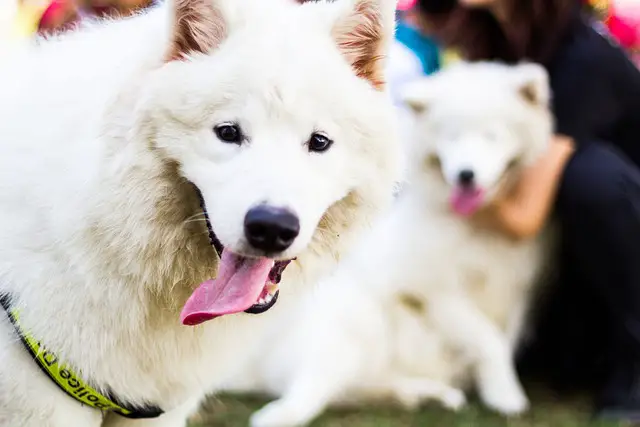We all know how much our furry friends mean to us, and it breaks our hearts to see them stressed or anxious.
In this blog post, we’ll dive into the world of Samoyed anxiety, exploring the causes, symptoms, and most importantly, practical tips to help your fluffy companion find their inner zen.
So grab a cup of tea, cuddle up with your Samoyed, and let’s discover the secrets to a calm and contented pup.
Samoyed anxiety symptoms

The following are some of the most common Samoyed anxiety symptoms you should know:
1. Excessive Barking: When Samoyeds experience anxiety, one way they may express it is through excessive barking. This can occur when they are feeling stressed, fearful, or overwhelmed. The barking serves as a way for them to communicate their distress or to try and alert their owners to potential threats. It’s important to note that excessive barking can also be a symptom of other issues, so it’s essential to observe other behaviors and consult with a professional if necessary.
2. Destructive Behavior: Anxiety can lead to destructive behavior in Samoyeds. When they are feeling anxious or stressed, they may resort to chewing on furniture, pillows, shoes, or other household items. This destructive behavior serves as a coping mechanism for them, providing a temporary distraction from their anxiety. It’s important to provide appropriate chew toys and engage in regular exercise and mental stimulation to help redirect their energy and alleviate their anxiety.
3. Potty Accidents: Some anxious Samoyeds may have accidents indoors, even if they are otherwise house-trained. Anxiety can impact their bladder control, causing them to have difficulty holding it in stressful situations. Additionally, an anxious dog may exhibit submissive urination, which is when they urinate as a submissive or appeasement gesture when feeling anxious or fearful. Patience, positive reinforcement, and creating a calm environment can help address this issue.
4. Pacing and Restlessness: Restlessness and pacing are common signs of anxiety in Samoyeds. An anxious Samoyed may constantly move around the house, unable to settle down or relax. This behavior is often a result of their heightened state of arousal and their need to release that pent-up energy. Providing them with a quiet and secure space, regular exercise, mental stimulation, and a consistent routine can help reduce their restlessness and promote relaxation.
5. Excessive Panting: Panting is a natural cooling mechanism for dogs, but excessive panting, even when not physically exerting themselves, can be a sign of anxiety in Samoyeds. Anxiety can raise their heart rate and body temperature, leading to excessive panting as a way to cool down. If your Samoyed is panting excessively, it’s important to ensure they are in a comfortable and cool environment. If their panting persists, it’s advisable to consult with a veterinarian to rule out any underlying medical conditions.
6. Escape Attempts: Samoyeds with anxiety may attempt to escape from their environment as a way to alleviate their anxiety. This can manifest as digging under fences, attempting to jump over walls, or even trying to squeeze through small openings. Escape attempts are often a result of their fear or discomfort in their current surroundings. It’s crucial to provide a secure and stimulating environment for your Samoyed to help reduce their anxiety and prevent escape attempts.
Causes of Samoyed Anxiety
Samoyed anxiety can be caused by various factors. Here are some major causes to consider:
1. Separation Anxiety: Samoyeds are highly social dogs that thrive on companionship and can become anxious when left alone for long periods. This can occur if they are not gradually acclimated to being alone or if they have experienced traumatic separations in the past. Symptoms of separation anxiety may include excessive barking, destructive behavior, house soiling, and attempts to escape. To help alleviate separation anxiety, gradual desensitization, and counterconditioning techniques can be used, along with providing mental and physical stimulation before leaving the dog alone.
2. Genetic Factors: Some Samoyeds may have a genetic predisposition to anxiety. Certain genetic disorders, such as progressive retinal atrophy (PRA), can lead to anxiety as the dog’s vision deteriorates. The loss of vision can make the dog feel vulnerable and anxious in unfamiliar situations. Regular veterinary check-ups and genetic testing can help identify potential genetic factors contributing to anxiety, allowing for appropriate management strategies.
3. Environmental Triggers: Samoyeds, like many other dogs, can be sensitive to specific environmental triggers that cause anxiety. Common triggers include thunderstorms, fireworks, loud noises, unfamiliar people or animals, and changes in routine. Dogs may exhibit signs of fear, such as trembling, panting, pacing, or hiding, when exposed to these triggers. Management strategies for environmental triggers may involve creating a safe and quiet space for the dog, using desensitization and counterconditioning techniques, and providing distractions or soothing music during anxiety-inducing events.
4. Lack of Socialization: Adequate socialization during a Samoyed’s early development is crucial for their emotional well-being and confidence. Insufficient exposure to different people, animals, environments, and stimuli during the critical socialization period (around 3 to 14 weeks of age) can result in anxiety or fearfulness later in life. It is important to expose Samoyed puppies to a wide variety of positive experiences and gradually introduce them to new situations in a controlled and positive manner. This helps them build resilience and confidence, reducing the likelihood of anxiety-related behaviors in adulthood.
5. Underlying Health Issues: Some underlying health conditions can contribute to anxiety in Samoyeds. Pain or discomfort caused by conditions like arthritis, urinary tract infections, dental problems, or hormonal imbalances can increase a dog’s overall stress levels and trigger anxiety. It is important to monitor the dog’s health and address any potential medical issues promptly. A veterinarian can provide a comprehensive examination and recommend appropriate treatment options to alleviate the anxiety associated with these health conditions.
Read more about leaving your Samoyed alone.
Addressing Samoyed Anxiety

Samoyeds, like any other breed, can experience anxiety. It’s important to address this issue to ensure the well-being of your furry friend.
Here are some effective ways to address Samoyed anxiety:
1. Provide a Safe and Comfortable Environment: Creating a safe and comfortable environment for your Samoyed is crucial in managing their anxiety. Ensure they have a designated space where they can retreat when they feel overwhelmed. This can be a cozy bed or a crate with a comfortable blanket. Additionally, provide them with toys and interactive puzzles to keep them mentally stimulated and engaged.
2. Regular Exercise and Mental Stimulation: Samoyeds are an active breed that requires regular exercise and mental stimulation to stay happy and balanced. Engaging in physical activities such as walks, runs, or playtime in a secure area can help burn off excess energy and reduce anxiety. Mental stimulation, such as training sessions, puzzle toys, or scent games, can keep their minds occupied and prevent boredom.
3. Establish a Routine: Dogs thrive on routine, and having a consistent daily schedule helps reduce anxiety. Establish regular feeding times, exercise routines, and sleep schedules. Predictability and stability in their daily lives can provide a sense of security and help alleviate anxiety.
4. Gradual Desensitization: Gradual desensitization is a technique used to help dogs overcome specific triggers that cause anxiety. For example, if your Samoyed has separation anxiety, you can start by leaving them alone for short periods and gradually increasing the duration. This gradual exposure helps them build confidence and reduces their fear or anxiety over time.
5. Positive Reinforcement Training: Positive reinforcement training focuses on rewarding desired behaviors to encourage and reinforce them. This training method helps build your Samoyed’s confidence and can reduce anxiety. Use treats, praise, or playtime as rewards when they exhibit calm behavior or respond well to training cues. This positive association promotes a sense of security and trust.
6. Provide Mental Enrichment: Mental enrichment is important for Samoyeds to prevent boredom and anxiety. Engage their minds by using puzzle toys, interactive feeders, or training games. These activities require problem-solving and keep their brains occupied, which can help alleviate anxiety by redirecting their focus.
7. Calming Supplements or Medications: In more severe cases of Samoyed anxiety, your veterinarian may recommend using calming supplements or medications. These can help manage anxiety symptoms and provide temporary relief. Natural supplements like chamomile or melatonin may be suggested, or prescription medications may be prescribed. It is important to consult with a veterinarian to determine the best course of action and dosage.
8. Seek Professional Help: If your Samoyed’s anxiety persists despite your efforts, it’s essential to seek professional help. A veterinarian or certified dog behaviorist can provide specialized guidance and develop a tailored plan to address your Samoyed’s anxiety. They can assess the underlying causes of the anxiety and recommend specific techniques or therapies to help your dog overcome their fears.
Remember, addressing Samoyed anxiety requires patience, consistency, and understanding. Each dog is unique, and it may take time to find the most effective strategies for managing their anxiety.
Working closely with a professional and providing a supportive environment will greatly improve your Samoyed’s well-being.
Frequently Asked Questions
How can I help my anxious Samoyed feel more at ease?
To help your anxious Samoyed, you can provide a safe and secure environment, establish a consistent routine, engage in regular exercise and mental stimulation, and use positive reinforcement training techniques. Additionally, some dogs may benefit from anxiety-reducing supplements or medications prescribed by a veterinarian.
Are there any natural remedies to calm an anxious Samoyed?
Yes, there are natural remedies that may help calm an anxious Samoyed. Some pet owners find success with techniques like aromatherapy using calming scents, the use of anxiety wraps or vests, playing soothing music, or using pheromone diffusers. However, it’s important to consult with a veterinarian before trying any natural remedies.
Can anxiety in Samoyeds be cured?
While anxiety in Samoyeds may not be entirely cured, it can be effectively managed with the right approach. With patience, consistent training, and a supportive environment, many dogs experience significant improvements in their anxiety levels. Each Samoyed is unique, so it’s important to work closely with a professional trainer or behaviorist to develop a tailored plan.
When should I seek professional help for my anxious Samoyed?
It’s advisable to seek professional help if your Samoyed’s anxiety significantly impacts their quality of life or if their behavior becomes increasingly problematic. A veterinarian or a certified animal behaviorist can provide a comprehensive assessment and develop a customized treatment plan to address your Samoyed’s specific needs.
Conclusion
In conclusion, dealing with Samoyed anxiety can be a challenging but rewarding journey. Remember, understanding your Samoyed’s needs and providing a safe and loving environment is key. Together, we can help our furry friends overcome their fears and live their best lives. Keep wagging those tails, my fellow pet parents!


